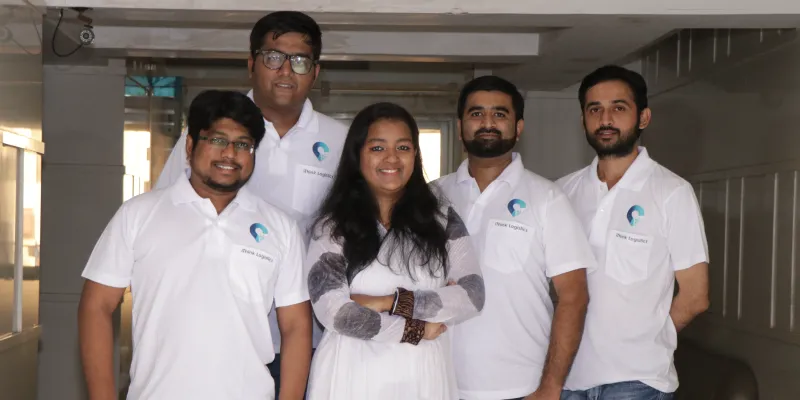How this logistics tech startup is using WhatsApp to increase efficiency and revenue
iThink Logistics helps ecommerce business owners maximise delivery of their parcels, with multiple logistics on one single platform using AI-ML automation. With WhatsApp, they were able to save time and effort in identifying customer intent and shipment delivery confirmation.
When Vipul Yadav, Paresh Parmar, Nikul Dodiya, Zaiba Sarang and Bharat Karotra first ventured into ecommerce, they realised a major reason for their ventures failing was the high return ratio and poor management of logistics in last-mile delivery.
“We analysed and discovered that the ecommerce logistics space has a lot of potential if we combine it with a technology-driven platform that uses artificial intelligence (AI) and Machine Learning to solve many problems and decrease return ration of e-sellers,” says Zaiba Sarang.

The founding team of iThink Logistics.
This led to the founding of Mumbai-based Quick Services LLP (ITL) in 2017, a technology platform that ensures that once a parcel leaves the premises of an online seller, it is efficiently monitored so that it can strategically reach the end customer.
The team of 30 individuals are helping ecommerce business owners maximise delivery of their parcels, giving them the power of multiple logistics in one single platform using AI–ML automation.
Founder journeys prior to starting up
Paresh Parmar managed a 200-plus team at Amazon for warehouse innovation and optimisation at scale. With seven-plus years of experience in logistics, he currently leads operations at ITL. Nikul Dodiya graduated as an engineer in EXTC and has consulted for several Fortune 500 companies in logistics. At ITL, he leads the finance department.
Zaiba Sarang started her career as a developer and moved up to being National Sales Head and Founder at Depasser infotech. With over seven years of experience, she now manages sales at Depasser and ITL with month-on-month exponential growth.
Bharat Karotra has more than seven years of experience in complex real-time, data-driven applications for enterprise security at scale. As the founder of Depasser, he has deep expertise in AI-ML, big data, web applications, mobile applications, data security, server optimisations, and security.
Vipul Yadav is the CEO at Depasser with seven-plus years of experience. A consultant and growth partner, he serves enterprise and mid-segment with product designs, roadmap defining, strategy making, team building, brand building, and technology patenting.
10x efficiency with WhatsApp
Like any other business, the team had its fair share of challenges. Communicating with customers on shipment delivery confirmation, delivery schedule, and urgent delivery was difficult. Due to this, many times shipment would get put on hold and this resulted in increasing returns.
They started using WhatsApp Business API Version 2.21.X and realised that it was 10 times more effective than automated calls.
“Identifying customer intent has become easier compared to calling assistance. Using effective communication, we have been able to reduce up to 6-8 percent returns of the shipment,” Zaiba says.
They have implemented a neural network that sends personalised segmented messages to buyers regarding order confirmation. Using Deep Learning, they automate WhatsApp replies based on customer responses.
They found the scalability and concurrency of messaging in WhatsApp the most useful, because of which they were able to save time and effort in identifying customer intent and shipment delivery confirmation.
“Customers were more delighted due to faster and real-time communication and brands/e-sellers found more customers,” Zaiba says.
On a growth spurt
iThink Logistics has been growing on an average 25 percent month-on-month basis for more than a year. Using WhatsApp, they have been able to grow their revenue at least 50x as compared to other communication tools.
“Earlier, with calling services, we were only able to reach 30 out of 100 customers. WhatsApp has let us reach around 80-90 customers,” Zaiba says.
Their return ratio has decreased by six to eight percent. Also, their average e-seller revenue increased by 18-20 percent, which was not possible earlier due to lack of effective customer communication and engagement.
(Edited by Teja Lele Desai)







![[2020 Outlook] Key logistics trends to watch out for this year](https://images.yourstory.com/cs/2/79900dd0d91311e8a16045a90309d734/logistics-1578328460813.png?fm=png&auto=format&h=100&w=100&crop=entropy&fit=crop)




